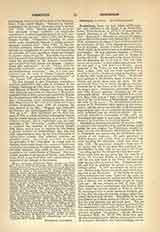

Feckenham, JOHN DE, last Abbot of Westminster, and confessor of the Faith; b. in Feckenham Forest, Worcestershire, in 1515(?), of poor parents named Howman; d. at Wisbech Castle, October 16, 1585. He became a Benedictine monk at Evesham, and studied at Gloucester Hall, Oxford (B.D., June 11, 1539), returned to Evesham to teach junior monks till the dissolution, January 27, 1540, when he received a pension of 15 marks. Rector of Solihull, Worcestershire (1544?-1554), he became known as an orator and controversialist. He was domestic chaplain to Bishop Bell of Worcester till 1543, and then to Bonner of London till 1549. He was sent to the Tower by Cranmer for defending the Faith, but in 1551 was “borrowed out of prison” to hold public disputations with the new men, e.g. with Jewel and Hooper. Again relegated to the Tower, he was released by Queen Mary, September 5, 1553, and was much employed as a preacher in London; he was advanced to benefices, and in March, 1554, made dean of St. Paul’s. He showed great mildness to the heretics, many of whom he converted, and saved others from the stake. He prepared Lady Jane Grey for death, though he could not convince her of her errors, as he did Sir John Cheke, the king’s tutor. Feckenham interceded for Elizabeth after Wyatt’s rebellion, obtaining her life and subsequent release. He took the degree of D.D. at Oxford, May, 1556, and on September 7, 1556, was appointed abbot of the royal Abbey of Westminster, restored to the order by the queen. The Benedictines took possession on November 21 (since known as dies memorabilis), and the abbot was installed on November 29, beginning his rule over a community of about twenty-eight, gathered from the dissolved abbeys. He successfully defended in Parliament, February 11, 1557, the threatened privileges of sanctuary, and restored the shrine of the Confessor in his abbey church.
Elizabeth at her accession offered (November, 1558) to preserve the monastery if he and his monks would accept the new religion, but Feckenham steadily refused, bravely and eloquently defending the old Faith in Parliament and denouncing the sacrilegious innovations of the Anglicans. He gave sanctuary to Bishop Bonner, and quietly went on planting trees while awaiting the expulsion, which took place July 12, 1559. He generously resigned a large part of the money due him to the dean who succeeded him. Nevertheless, in May, 1560, he was sent to the Tower “for railing against the changes that had been made”. Three years later he was given into the custody of Horne, the intruded Bishop of Winchester, but in 1564 he was sent back to the Tower, his episcopal jailer having failed to pervert him. Feckenham himself said that he preferred the prison to the pseudo-bishop’s palace. In 1571 he prepared his fellow-prisoner, Blessed John Storey, for death, and a little later was sent to the Marshalsea. In the Tower he and his fellow-confessors had been “haled by the arms to Church in violent measure, against our wills, there to hear a sermon, t tmef persuading us-hut- of rig upon us.” He was released on bail, July 17, 1574, after fourteen years’ confinement, and lived in Holborn, where he devoted himself to works of charity. He encouraged boys in manly sports on Sundays, preferring that they should practice archery rather than attend the heretical services. But falling ill, he was permitted to go to Bath, where, in 1576, he built a hospice for poor patients and did much good. But his zeal for the Faith excited fresh rancour, and in 1577 he was committed to the custody of Cox, Bishop of Ely, who was requested to bring him to conformity. Feckenham’s so-called “Confession” (British Museum, Lansdowne MSS., No. 30, fol. 199) shows how egregiously Cox failed, and in 1580 he petitioned the council to remove the abbot, who was accordingly sent to Wisbech Castle, a dismal prison belonging to the Bishops of Ely, which he shared with Watson, Bishop of Lincoln, and other confessors. Here he died a holy death, fortified by the Sacred Viaticum, and was buried in Wisbech Church. He was worn out by an imprisonment of twenty-three years for conscience’ sake; a striking example of Elizabeth‘s ingratitude. Protestant writers unite in praising his virtues, especially his kindness of heart, gentleness, and charity to the poor. Even Burnet calls him “a charitable and generous man”. His best-known work is against Horne, “The Declaration of such Scruples and Stays of Conscience touching the Oath of Supremacy”, etc. He also wrote “Caveat Emptor”, a caution against buying abbey lands, and a commentary on the Psalms, but these are lost.
BEDE CAMM

